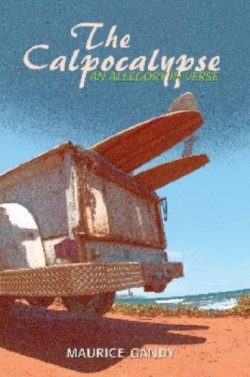The Calpocalypse
An Allegory in Verse
Suppose Brian Wilson and David Lynch had a car accident, mixed up their medications at the hospital, then decided to collaboratively reveal the dark lining of the sixties’ SoCal surf culture through a surrealistically narrative string of rhymes. The Calpocalypse shuffles kaleidoscopic scores of characters between sixty-four adventurous poems set on Pacific beaches, in Tijuana bordellos, the empty desert, and San Francisco. The settings are united by a vehicle referred to as the “Nero Warship,” an ambulatory home base.
The time period is signified primarily by contention over abortion and anti-nuclear protests; the concern isn’t historicity, it’s existentialism. A mythical facsimile has advantages to characters who claim: “We don’t crave life. / We only want a prototype.” As the reality paradoxes of Lynch’s Mulholland Drive dissolve on delivery of that movie’s key line: “Everything is pre-recorded,” so similarly a voice in “Mad, Mad Mexisex” cuts through forty years of conceptual drift to say, “I’m not really here.” Gandy takes a postmodernist tactic of frequent reminders to readers that they aren’t living another person’s story; they’re taking in a book. An example of this is in “Unholy Coyote Controls”: “‘Don’t leave me!’ / called the old man after. / ‘I’m in on the last chapter.’”
The majority of the cycle uses familiar end-rhyme schemes. On occasion an overloaded couplet strains toward implosion: “Who knows what the knows know / and what length the nose has to grow?” When rhyme frequency drops to a sparser spread, the words are precise and important, and subjects particularize from archetypal approximations to frail humans with implied backstories. A disadvantaged woman clinging to denial of her fate is captured in “Xenmystique”: “‘La Nina Desperada / has not settled yet / into life with no mañana. / She struggles with disgrace.’”
Legal names are eclipsed by terms of functional description. Here are Jivejello, Twyla Holyhocks, Coyote Conquistador, Macho Peaches, and the unforgettable Apache Mama, whose breasts are tattooed “Milk” and “Malice.” Multiple nicknames assigned to central figures obscure the significant facts. Some secondary figures are more correctly defined as constructs than people. Readers who withstand the diversionary cross-traffic of Basque shepherds and helicopter wash to keep a hold of the main threads should allow themselves a moment of smug gloating.
There’s much to appreciate in this journey through the mists of a decayed left-coast Avalon, where the struggles encompass big ideas. Maurice Gandy breaks fresh linguistic ground, inventing words and assigning new usages for punny mashups of existing language, like “eternaseconds,” “shrinkinitis inhibosa,” and “further mucker.” Gandy’s first book of poems was An Uncharted Inch. This Alabama-based poet, humorist, and educator puts it all out there, an elaborate waking dream of adventure and destruction. The Calpocalypse is an unapologetically zestful and half-fantastical representation of a time when reality was easy to shake off.
Reviewed by
Todd Mercer
Disclosure: This article is not an endorsement, but a review. The publisher of this book provided free copies of the book and paid a small fee to have their book reviewed by a professional reviewer. Foreword Reviews and Clarion Reviews make no guarantee that the publisher will receive a positive review. Foreword Magazine, Inc. is disclosing this in accordance with the Federal Trade Commission’s 16 CFR, Part 255.

